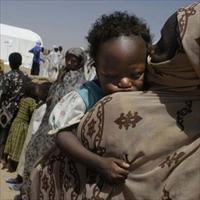CAMEROON: Movement of refugees to Maltam Camp ongoing, over 5,500 relocated

In response to the inflow of Chadian refugees into Cameroon’s northeastern town of Kousséri earlier this month, 5,523 persons have already been relocated to a newly equipped camp in the village of Maltam, while an estimated 10,000 more are expected to join them in the coming weeks.
“At one point, we had at least 30,000 refugees in the country, but many have returned to Chad,” said Sophie de Caen, United Nations Resident Coordinator for Cameroon. “At present, along with the Cameroonian authorities, we plan to continue providing assistance and protection to an estimated 15,000 refugees, until they feel comfortable enough to return home,” she stated.
The refugees, who started to arrive on 2 February when fighting erupted in the Chadian capital N’Djamena, were initially hosted in two temporary sites in Kousséri, as well as in local schools, churches, and private homes. “We have immediately started equipping a camp in Maltam, 32 km away,” explained Jacques Franquin, Representative of the Office of the United Nations High Commissioner for Refugees (UNHCR) in the country. “The camp will enable us to provide assistance and protection in the best possible way,” he added.
The first refugees arrived in Maltam on 16 February, and more are being offered transport from Kousséri to the camp every day. The camp has already been equipped with 1,060 family tents, two boreholes, and 226 latrines – the latter funded and constructed by the International Federation of Red Cross and Red Crescent Societies (IFRC). All refugees relocated to Maltam have already received essential non-food items (NFIs) from UNHCR, such as plastic sheeting, sleeping mats, blankets, mosquito nets, jerry cans, cooking stoves, soap, and sanitary items.
The transport operation and the equipment of the Maltam camp, as well as the aid and protection provided there, are largely possible thanks to a grant of $4.7 million from the United Nations Central Emergency Response Fund (CERF) to six United Nations entities involved in the operation.
“So far, we have completed five general food distributions, targeting all refugees newly arrived in Maltam,” said Abdoulaye Baldé, acting Representative of the World Food Programme (WFP) in the country. He added that a total of 28 metric tonnes (MT) of food was distributed, due to last until the next distribution planned for 03 March. The WFP is also providing logistic support for the operation, especially in terms of transport and storage of aid supplies.
As the refugees reached Maltam, nutritional screening started under the leadership of the United Nations Children Fund (UNICEF), the Red Cross Movement, and Médecins Sans Frontières (MSF) from several countries. “About 25 cases of moderate malnutrition and nine of severe malnutrition were identified, and we are working to address these,” said Christyne Bahringer, a UNICEF spokesperson in Cameroon. “Following successful completion of vaccinations against measles and poliomyelitis on 17 February in Kousséri, a campaign against meningitis is also due to start this Thursday, in the Maltam camp and its surroundings,” she added.
The UNICEF has also concluded a cooperation agreement with the non-governmental organization (NGO) Action Aid, in order to provide recreational and educational opportunities for children in the Maltam camp.
While the Chadian refugee emergency in Cameroon is now under control, the United Nations remains gravely concerned about the continued humanitarian crisis in eastern Chad. “There are over 250,000 Sudanese refugees and over 180,000 internally displaced persons [IDPs] in eastern Chad, the vast majority of whom are heavily reliant on humanitarian aid for their survival,” said Eliane Duthoit, head of the Office for the Coordination of Humanitarian Affairs (OCHA) in Chad. “Our life-saving operations in eastern Chad have continued despite the recent deterioration in the security situation. We must ensure that they are never interrupted, as the current crisis could otherwise turn into a humanitarian disaster,” she added.
 Back and Next - Back and Next
Back and Next - Back and Next See Also - See Also
See Also - See Also